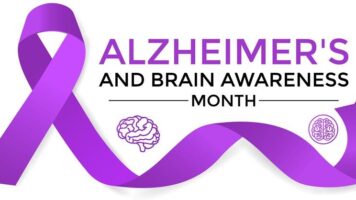Monthly Newsletter
CBF Celebrates May Health Observances
May 2025
California Life Sciences Celebrates May Health Observances
Each May, the world unites to recognize a host of vital health awareness campaigns—shining a spotlight on diseases and conditions that impact millions. Thanks to groundbreaking innovations from the life science industry, many of these once-devastating diagnoses are now manageable or even treatable. Remarkably, many of these life-changing therapies trace their origins back to California —the birthplace of biopharma innovation and a global leader in advancing human health.
CBF would like to focus on a few of these health awareness campaigns and highlight the impact life sciences has made to change the health and lives of people living with these conditions.
Mental Health Awareness Month was established by Mental Health America to educate the public about mental illness, raise awareness surrounding research and treatments, reduce the stigma associated with mental illness, and celebrate recovery from mental illness.
Just like cancer, diabetes, or heart disease, mental illness is a treatable medical condition. Today, a wide range of therapies exist for anxiety, depression, bipolar disorder, schizophrenia, OCD, and more. Many life science companies and patient advocacy groups are committed to advancing treatments that help individuals manage these conditions and improve their quality of life.
Although developing effective mental health treatments is complex and expensive, researchers are making exciting progress. From gene-based therapies to novel diagnostics and medicines, over 160 innovative treatments are currently in development. These include a dopamine/norepinephrine reuptake inhibitor for ADHD; a dual-therapeutic oral treatment for resistant depression; a pherin-based nasal spray for anxiety; and a first-in-class therapy targeting cognitive impairment in psychiatric and neurological disorders.
Visit these websites to learn more about Mental Health Awareness Month as well as mental health conditions and treatments: Mental Health America in California, NAMI California, 988 Suicide & Crisis Lifeline, Steinberg Institute, The Trevor Project.
Women’s Health Month (& Week) is dedicated to promoting awareness of women’s health issues, fighting misinformation, and encouraging women to take steps toward improving their health and well-being. It also serves as a platform to highlight health disparities, promote access to care, and support research and innovation in women-specific health conditions.
Women’s health encompasses a spectrum of challenges that require a tailored approach. Hormonal fluctuations, autoimmune conditions, reproductive health, woman-specific cancers and many other aspects set women’s health on a path that is distinct from men’s.
In recent years, the life science industry has played a pivotal role in advancing treatments for health conditions that uniquely or disproportionately affect women. From reproductive health to autoimmune disorders and cancers such as breast and ovarian, biopharma innovation is delivering more personalized, effective therapies thanks to advances in molecular biology, genomics, immunotherapy, and precision medicine.
Biophama is also developing cutting-edge diagnostics and therapies that address the root causes of many women’s health issues, rather than just managing symptoms. For example, non-hormonal treatments for menopause are offering alternatives to women who can’t or choose not to take hormone therapy. Breast cancer genetic testing, including biomarkers, are helping to identify individuals at higher risk, allowing for earlier and more personalized interventions. In the fertility space, life-science innovation has improved success rates in IVF treatments and expanded options through egg preservation and genetic screening. Additionally, targeted biologic therapies are showing promise for autoimmune diseases like lupus, rheumatoid arthritis, and multiple sclerosis, which predominantly affect women.
Future treatments for women include precision medicine, gene therapies, hormone replacement and hormone-free options for conditions like endometriosis, menopause, osteoporosis, and polycystic ovarian syndrome, offering alternatives to surgery. Breast and cervical cancer vaccines are on the horizon with clinical trials underway. Additionally, companies are exploring gene-editing techniques to treat inherited cancers like BRCA-related breast and ovarian cancers, while microbiome-based therapies show promise for managing vaginal and urinary tract health. These advancements aim to address the unique needs of women’s bodies and improve overall health outcomes. Visit the WomenTech Network to learn more.
Hepatitis Awareness Month is a time to spotlight the hidden epidemic of viral Hepatitis in the U.S. and encourage testing, vaccination, and treatment. Hepatitis, an inflammation of the liver usually caused by a virus, infects tens of thousands annually and can lead to liver failure, cancer, or death if left untreated. Viral Hepatitis disproportionately affects vulnerable communities, including people of color, those who are incarcerated, people who inject drugs, and individuals over 60 with risk factors.
Thanks to advances in biopharma, there are tools to manage or eliminate these viruses. In fact, Hepatitis A and B are vaccine-preventable, and Hepatitis C is curable—but diagnosis is key. The Centers for Disease Control (CDC) recommends all adults get tested for Hepatitis B and C at least once, and pregnant women during each pregnancy. The only way to know if you have Hepatitis is to get tested.
Visit the CDC or HepVu to learn more.
Stroke Awareness Month is a time to highlight the importance of preventing, recognizing, and treating stroke—one of the leading causes of death and disability in the U.S. According to the Centers for Disease Control (CDC), nearly 795,000 Americans experience a stroke each year, with over 140,000 deaths. While more common in older adults, stroke can affect anyone, making awareness of risk factors and symptoms essential.
A stroke occurs when blood flow to the brain is disrupted, either by a clot blocking a vessel (ischemic stroke) or a vessel rupturing (hemorrhagic stroke). Both types can lead to serious impairments, including loss of movement, vision, speech, balance, and cognitive function.
The life sciences industry is driving innovation in stroke care—from FDA-approved clot-busting drugs like Alteplase and Tenecteplase to cutting-edge diagnostics and emerging therapies. Life science advancements include AI-powered imaging, rapid blood tests, and genetic screening tools that enable faster diagnosis and personalized prevention. Researchers are also exploring the brain’s ability to heal itself through neural plasticity and restore movement and function lost after a stroke. Visit the CDC or the National Institute of Neurological Disorders and Stroke for more information about stroke and stroke treatment innovations.
Stay informed on the latest news and trends on the economic and health benefits of this industry by visiting CABiotech.org
If you have any questions about hosting informational briefings for your colleagues serving in the legislature, contact California Biotechnology Foundation Executive Director Patty Cooper at (916)764-2434 or [email protected].



